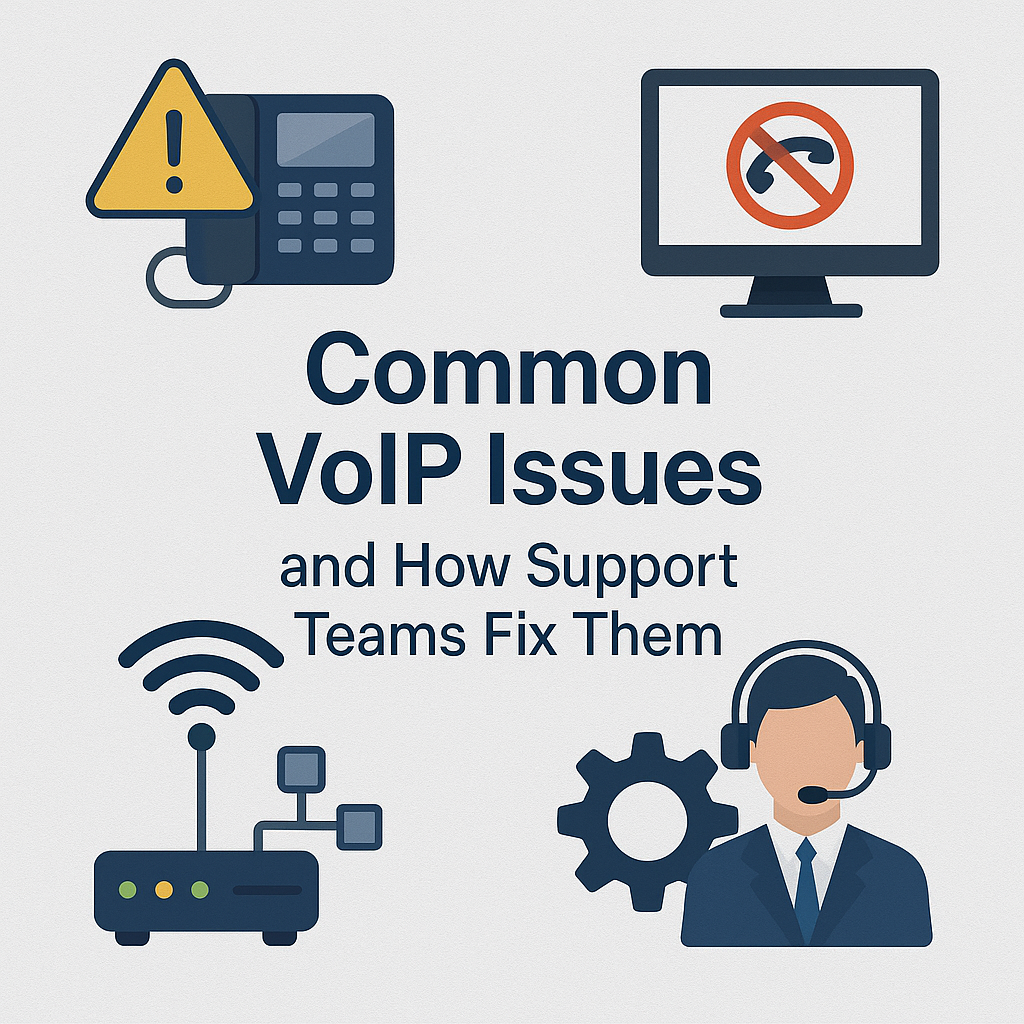The Importance of VoIP Support for Modern Businesses
In today’s fast-paced digital world, effective communication is the cornerstone of any successful firm. If your team is geographically dispersed in various locations, communicating with international clients, or merely seeking to enhance customer services, traditional phone systems fall short in flexibility, scalability, and costs. This is where VoIP assistance comes into the picture. Voice over Internet Protocol (VoIP) revolutionized business connectivity and enabled calls, video conferences, and instant messaging through internet technology. Real value of VoIP support, however, extends beyond the ability to make calls it lies in the end-to-end support services that ensure seamless functioning, security, and optimization.
What is VoIP and Why Does It Matter?
VoIP, or Voice over Internet Protocol, refers technology that enable users to place voice calls through a broadband internet connection rather than a dedicated landline. This innovation makes communications more flexible, expandable, and cost-effective. Through VoIP, companies can consolidate their communications by combining voice calls, video meetings, instant messaging, and even file transfers in one platform.
However, just like with any technology, VoIP systems require periodic maintenance, repair, and adjustment. That’s where VoIP services comes in. With trained professionals at their beck and call, companies not only get their systems installed correctly but also have high-quality connections, little downtime, and solid defense against cyber attacks.
Why Companies Require VoIP Support
1. Ensuring System Reliability
One of the biggest concerns companies have with VoIP is call quality. Jitter, packet loss, or dropped calls will annoy staff and customers in seconds. Without VoIP expert assistance, these issues persist, damaging productivity and customer trust. Support teams monitor system health, troubleshoot issues, and optimize network performance to guarantee crystal-clear communication.
2. Enhancing Security
VoIP travels over the internet and is thus susceptible to online threats such as phishing, hijacking of calls, and denial-of-service attacks. If security is not implemented, confidential communications and information can be breached. Highly skilled support providers offer advanced security features, firewalls, and encryptions to secure communications. They offer proactive monitoring to prevent breaches from occurring.
3. Scalability and Growth
As business grows, the communication needs become more. Adding new users or turning on new features needs to be simple, but without professional guidance, it becomes clumsy. VoIP support ensures easy scaling up and at a reasonable cost. Whether you double the size of your organization or roll out to new offices, your VoIP infrastructure scales seamlessly without downtime.
4. Maximizing ROI
VoIP investment must be less expensive for your business compared to standard phone systems. Inefficiencies, though, arise from incorrect setting or a lack of any maintenance. Professional assistance optimizes the use of this investment by businesses with efficient processes, less downtime, and leverages the new features such as call analytics and CRM integration.
Common Problems Without VoIP Support
Firms that deploy VoIP without seeking professional advice often suffer from common problems:
Substandard call quality: Due to lack of enough bandwidth or miscalibrated networks.
Downtime: Crashes with no prompt recovery mechanisms.
Security vulnerabilities: Vulnerabilities due to weak defense against cyber-attacks.
Complex integrations: Trouble integrating VoIP with CRM or collaboration solutions.
Employee frustration: Lack of proper training or support leads to low adoption levels.
These issues count on why VoIP services is no longer a nice-to-have, but a requirement for business continuity and growth.
What VoIP Support Comprises
When businesses sign up for a contract with a VoIP support provider, they get entitled to various services that enable the working of communication systems in their optimal form:
24/7 Monitoring and Diagnosis: The incessant monitoring makes sure that potential issues are found and fixed before they impact business operations.
System Optimization: Support staff configure settings to maximize call quality and performance.
User Training: Employees are trained to achieve the best out of VoIP features, enhancing productivity.
Integration Services: Integrating VoIP with existing systems like CRM software, project management software, and email systems.
Security Management: Regular updation, encryption, and firewall maintenance secure communications.
Disaster Recovery Planning: Offering redundancy and failover capability to keep communication systems running in the event of downtime.
The Significance of Managed VoIP Support
Small and medium-sized enterprises, however, do not always have the luxury of having an in-house team of IT professionals specifically to manage VoIP alone. That is where managed VoIP support steps in. With managed services, technical responsibilities are outsourced to professionals who work from installation right through to maintenance.
This model allows businesses to preserve core operations while benefiting from the security of stable communication systems. Besides, managed support typically entails a fixed monthly cost, which allows businesses to budget more appropriately without being hit with unexpected bills for system failures or disasters.
Future of VoIP and Support Services
The destiny of VoIP is closely connected with remote working, artificial intelligence, and cloud computing trends. Artificial intelligence is beginning to influence the destiny of VoIP by offering live transcription, intelligent call routing, and even predictive customer care analysis. As these technologies continue to evolve, the nature of VoIP systems will become more sophisticated, making expert assistance even more necessary.
Selecting the Proper VoIP Support Provider
There is no one-size-fits-all provider, so pay close attention. When looking at providers, take the following into consideration:
Experience and Expertise: Opt for a provider that has a successful history in your market.
Availability: Ensure 24/7 support is offered, especially if your business operates across different time zones.
Scalability: The provider should support your long-term growth and technology needs.
Security Standards: Confirm that robust security measures are in place to protect sensitive data.
Customer Reviews: Check testimonials or case studies to see how the provider has helped similar businesses.
Final Thoughts
Effective communication is the lifeline of every business. VoIP technology has transformed business communication, offering cost savings, scalability, and expanded features. Without proper guidance and control, businesses leave themselves open to poor performance, security vulnerabilities, and investments wasted.
That is why support for VoIP counts. With everything from providing immaculate call quality to safeguarding confidential data, expert support allows organizations to maximize the potential of their communication infrastructure while being future-proofed. With managed services or in-house expertise, the ideal investment in support means that your VoIP support platform is always a reliable resource driving collaboration, productivity, and business performance.





No comment